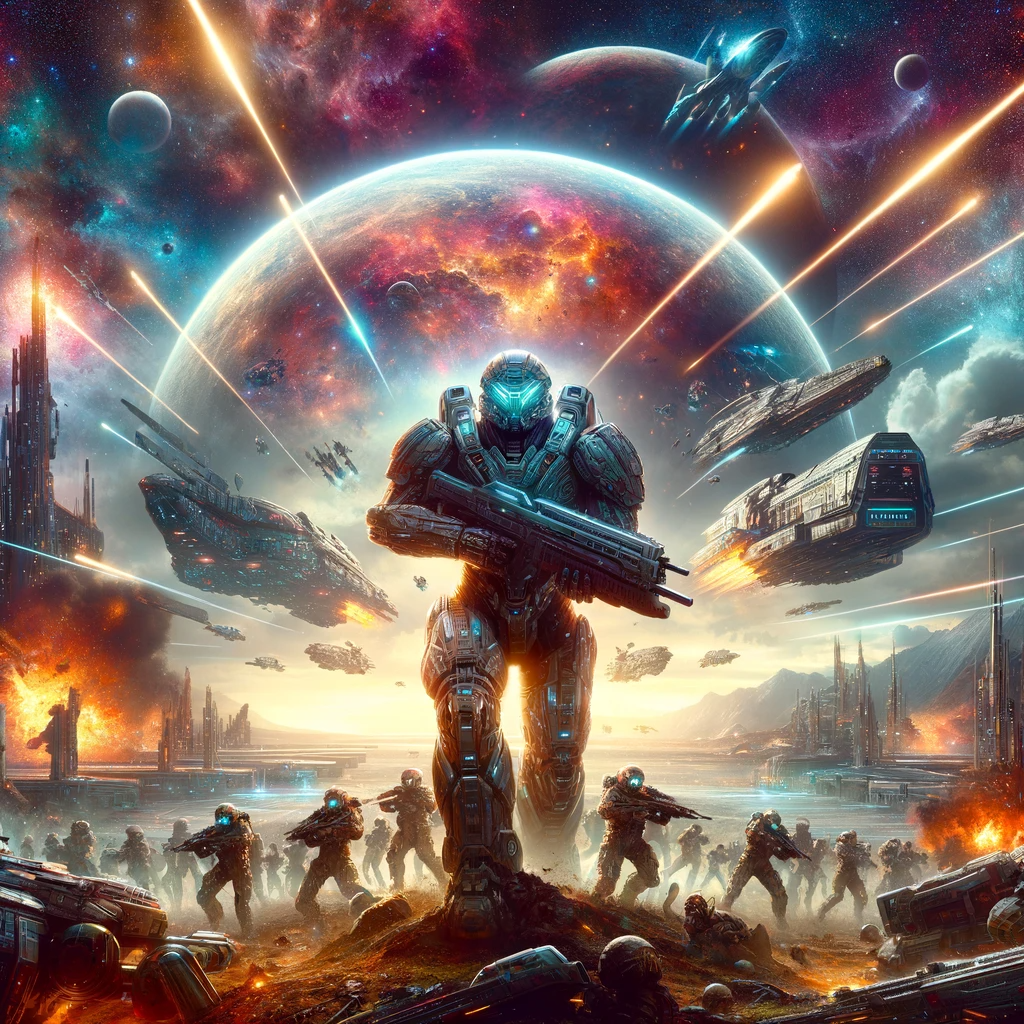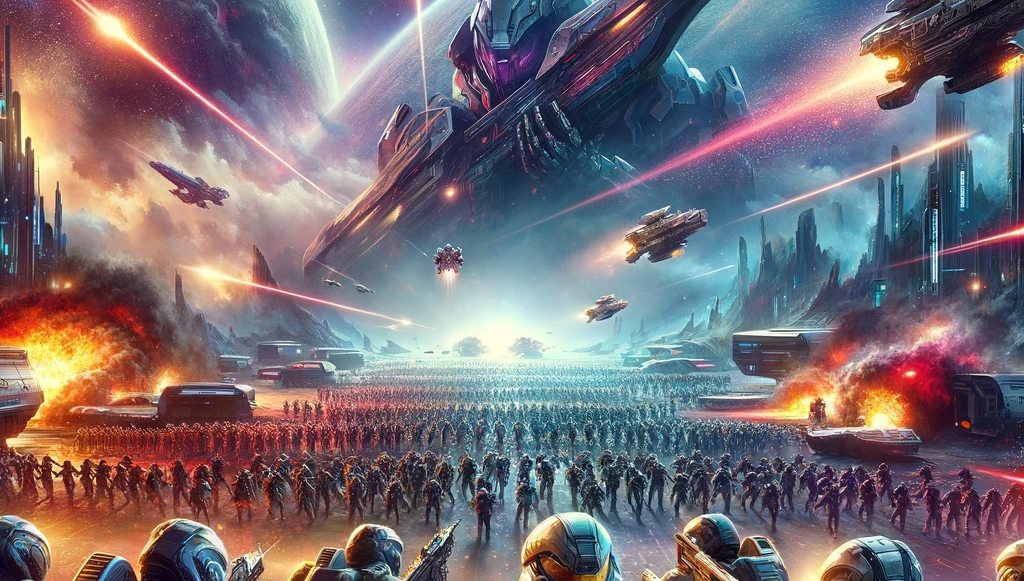By Alex Turner
It was the early 2000s, and the world of real-time strategy games was undergoing a revolution. Among the genre’s shining stars, “Warhammer 40,000: Dawn of War” emerged as a dark and brutal masterpiece. Little did I know that as I clicked my way into the grim and dystopian universe of Warhammer 40k, I was about to embark on a relentless journey of bloodshed, tactical brilliance, and a gripping narrative that would keep me hooked for years.
The Grim Darkness of the 41st Millennium
“Dawn of War” plunged me deep into the grim darkness of the 41st millennium, a dystopian future where humanity’s survival hung in the balance. The game’s bleak and war-torn setting, featuring warring factions, alien species, and a universe steeped in grim lore, struck me from the very beginning.
I was immediately captivated by the game’s lore, which drew heavily from the vast Warhammer 40k tabletop universe. The dark narrative, centered around the war-torn planet of Tartarus, where factions fought for control of a powerful relic, immersed me in a story of betrayal, corruption, and the relentless pursuit of power.
The intensity of the opening cinematic, with its iconic lines, “In the grim darkness of the far future, there is only war,” set the tone for the brutal and unrelenting journey that awaited.

The Battle Begins: The Space Marines
In “Dawn of War,” I first assumed the role of the Space Marines, the iconic and superhuman warriors of the Imperium of Man. Leading the Space Marines into battle was a baptism of fire. The tactical depth of the game became immediately apparent as I faced off against the sinister forces of Chaos.
One memorable situation occurred during a mission where I had to defend a crucial location from relentless waves of Chaos cultists. The pressure was palpable as I struggled to hold the line, using cover and flanking maneuvers to repel the enemy onslaught.
The sense of satisfaction that came with a hard-fought victory, where every decision and unit placement mattered, was incredibly rewarding. It was a testament to the game’s tactical brilliance and the importance of strategic thinking in the face of overwhelming odds.
The Ork Waaagh! and the Eldar Psykers
As I delved deeper into the campaign, I encountered two other iconic factions: the rampaging Orks and the enigmatic Eldar. Each faction offered a unique playing experience, from the brute force of the Ork Waaagh! to the psychic powers of the Eldar Psykers.
One situation that struck me was a battle against the Orks in a massive desert landscape. The sheer numbers and brutality of the Orks, led by their Warboss Gorgutz ‘Ead ‘Unter, posed a formidable challenge. It required careful positioning of my troops and well-timed artillery strikes to emerge victorious.
Conversely, the Eldar missions presented a different kind of challenge. Their agility and psychic abilities allowed for hit-and-run tactics, making them a formidable adversary. Engaging in battles against the Eldar, with their ability to teleport and manipulate the battlefield, was a stark contrast to the Ork’s brute force.
The diversity of factions and their respective playstyles added layers of complexity and excitement to the game, ensuring that each encounter felt fresh and engaging.
Heroic Leaders and Epic Battles
One of the standout features of “Dawn of War” was the presence of hero units, iconic characters with unique abilities and the power to turn the tide of battle. These heroes became the focal point of my armies and the key to victory in many situations.
The heroic Space Marine Captain, Gabriel Angelos, stood out as a memorable character. Leading him into battle, I witnessed epic moments where his abilities, like the powerful orbital bombardment, unleashed devastating destruction upon my foes.
Another memorable hero was the Eldar Farseer, Macha, whose psychic powers could tip the balance of battles. Her ability to manipulate time and control the battlefield created moments of strategic brilliance and satisfying victories.
The game’s dynamic environments also added to the epic battles. Cities would crumble under the onslaught of artillery, and terrain would be scarred by the relentless conflict. It was a visual spectacle that accentuated the sense of scale and the ferocity of warfare in the 41st millennium.
The Relentless Campaign and Moral Choices
The “Dawn of War” campaign was not just a series of battles; it was a gripping narrative that unfolded with each mission. The choices I made during the campaign affected the storyline, and moral decisions often had consequences.
One such decision involved a pivotal moment where I had to choose between the survival of a valuable character or completing an important mission objective. The weight of that choice, knowing that it would shape the outcome of the campaign, was striking. It added depth to the narrative and left a lasting impact on the way I approached subsequent missions.
The sense of immersion and attachment to the storyline was further enhanced by the game’s outstanding voice acting, which brought the characters to life and added layers of emotion and drama to the unfolding events.
Multiplayer Mayhem and Customization
“Dawn of War” offered a robust multiplayer mode that allowed for fierce battles with friends and players from around the world. The multiplayer matches, whether in standard skirmishes or objective-based scenarios, were a test of skill and strategy.
Customization was another highlight of the game, allowing players to tailor their armies and experiment with different tactics. From selecting unit loadouts to choosing doctrines that provided unique bonuses, the customization options added depth and replayability to the multiplayer experience.
The Dawn of a Legacy
As I look back on my time with “Dawn of War,” I can’t help but appreciate the impact it had on my gaming journey. It was more than just a game; it was a saga of blood, battle, and galactic conquest that immersed me in a universe of relentless warfare and moral dilemmas.
The legacy of “Dawn of War” lives on as a testament to the brilliance of its gameplay, the depth of its lore, and the unforgettable moments it provided. It remains a cherished title among fans of both the Warhammer 40k universe and real-time strategy games, and its enduring appeal continues to captivate gamers worldwide.
In Conclusion
“Dawn of War” was not just a game; it was an epic odyssey through the grim and brutal universe of Warhammer 40k. It challenged me with its tactical brilliance, immersed me in a gripping narrative, and left me with memories of heroic leaders, epic battles, and moral choices that will forever define my gaming journey.
